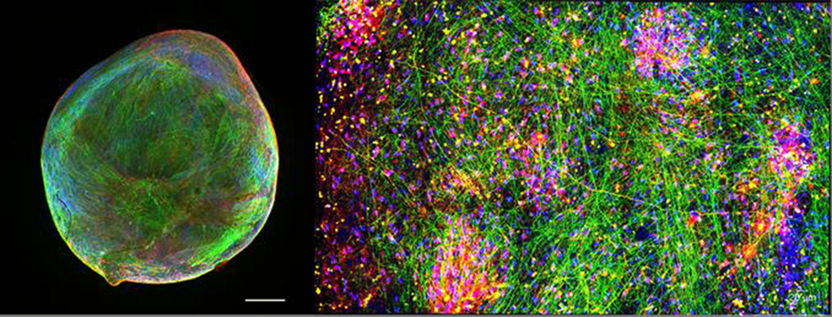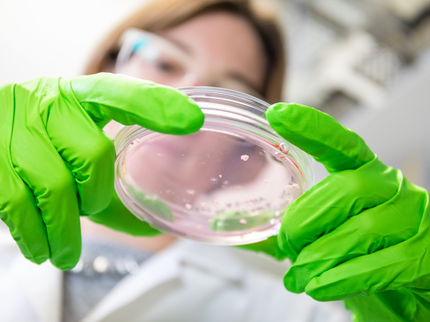Generation of human brain organoids with the ability to learn
Bioengineered Neuronal Organoids recapitulate important morphological features of the human brain
The brain is one of the most complex organs in the human body. Complexity of the brain is the result of highly and dynamically interconnected neurons as well as supporting glia. Lifelong changes in neuronal interconnectivity are key for memory and learning. Disturbances in neuronal interconnectivity underly neurodegenerative diseases.

Left: A Bioengineered Neuronal Organoid (BENO); Right: High power magnification of a neuronal network in a BENO.
Zafeiriou
Scientists from the Institute of Pharmacology and Toxicology at the University Medical Center Göttingen (UMG), in collaboration with colleagues from the Cluster of Excellence "Multiscale Bioimaging" (MBExC) and the German Center for Neurodegenerative Diseases (DZNE), have now succeeded for the first time in creating neuronal networks displaying the complex functions of the human brain from human induced pluripotent stem cells. These so-called Bioengineered Neuronal Organoids (BENOs) are thus suitable to study the loss of learning ability and memory in neurodegenerative diseases in more detail. Pharmacological and electrical stimuli were applied to confirm the classical developmental switch from an embryonic to a more advanced pattern of excitability.
The scientists exploited an array of assays to decipher the developmental complexity down to the cellular level in BENOs and could demonstrate the presence of key components of the human brain. “It was truly exciting to observe processes, which underly memory and learning, known as neuronal plasticity, in our BENO model”, says first author Dr. Maria-Patapia Zafeiriou, scientist at the Institute of Pharmacology and Toxicology, and member and application specialist at the MBExC. Prof. Dr. Wolfram-Hubertus Zimmermann, senior author, director of the Institute of Pharmacology and Toxicology and member of the MBExC adds “This first evidence for complex, physiological function in a lab-grown brain organoid will be further explored to study mechanisms and innovative therapies for degenerative diseases of the brain, such as stroke, epilepsia, and dementia”.
BENOs and first applications
BENOs are already finding initial applications in disease modelling, for example epilepsy syndromes, and drug testing. The availablity of induced pluripotent stem cells as the starting material for BENOs allows for the creation of BENOs from literally every individual, healthy and diseased. This opens the door for the development of patient-specific therapies. "This not only opens the door to the development and preclinical testing of individualised procedures directly on the human model. In principle, it will also be possible to cultivate replacement tissue for the treatment of patients suffering from neurodegenerative diseases," says Prof. Dr. Zimmermann.
Although our understanding of the human brain remains incomplete and, accordingly, therapeutic approaches to prevent or repair degeneration are largly insufficient, the availability of brain organoids with a cellular composition and function similar to the human brain will advance our understanding of how the human brain develops and functions properly as well as what causes neurodegeneration. The authors anticipate that the introduction of the BENO technology will support the search for innovative cures for todays most debilitating brain diseases. The University Medical Center Göttingen has filed a patent to protect the BENO technology and has licensed it to myriamed GmbH, a spin-off from the University Medical Center Göttingen, with a focus on drug discovery.
Original publication
Other news from the department science

Get the life science industry in your inbox
By submitting this form you agree that LUMITOS AG will send you the newsletter(s) selected above by email. Your data will not be passed on to third parties. Your data will be stored and processed in accordance with our data protection regulations. LUMITOS may contact you by email for the purpose of advertising or market and opinion surveys. You can revoke your consent at any time without giving reasons to LUMITOS AG, Ernst-Augustin-Str. 2, 12489 Berlin, Germany or by e-mail at revoke@lumitos.com with effect for the future. In addition, each email contains a link to unsubscribe from the corresponding newsletter.
Most read news
More news from our other portals
Last viewed contents
Carpus






















































